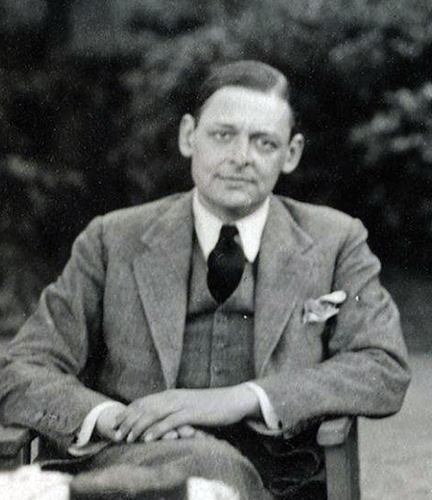
For example, despite occasional revivals of Murder in the Cathedral or The Family Reunion, Eliot’s verse dramas might not endure as long as Shakespeare’s. Meanwhile, Eliot’s other poems tend to feature in high school and college reading lists. Eliot himself said that the world of poetry divides between Dante and Shakespeare, and Dante especially holds the key to understanding some of Eliot’s poems.
In 1944, Eliot published a slim volume called Four Quartets. It comprises four poems written and published separately in the early 1940s. Together they achieve unity and coherence and can be seen as one long poem in four parts. In general, Kirk said that, “All that such a poem as Four Quartets may accomplish is to relate one remarkable man’s vision of time, self, reality, and eternity: to describe one person’s experience of transcendence.” It is a heavy burden, but the book’s forty-some pages can bear it.
The fourth of the four poems, “Little Gidding,” stands as a miniature version of Dante’s Divine Comedy. Oddly, Kirk seems to have missed this aspect of the poem. However, he did explain that Little Gidding is a remote village in eastern England, about thirty miles northwest of Cambridge. In the seventeenth century, the small church there was home to an Anglican religious community.
Eliot captures Little Gidding’s geographical isolation by referring to one’s getting there, “when you leave the rough road/And turn behind the pig-sty to the dull façade/And the tombstone.” As he puts it, “There are other places/Which also are the world’s end, . . . But this is the nearest, in place and time,/Now and in England.” The church at Little Gidding becomes Eliot’s equivalent to Dante’s dark wood, his portal into the mystical world.
Eliot underscores the spiritual reason for one’s journey there. “You are not here to verify,/Instruct yourself, or inform curiosity/Or carry report. You are here to kneel/Where prayer has been valid.” One is on pilgrimage, kneeling in obscurity and acknowledging and bewailing one’s manifold sins and wickedness, as the old Prayer Book has it.
Once one has entered this dimension, communication with the faithful departed can occur. There remains the mundane world, where “the dead leaves still rattled on like tin/Over the asphalt where no other sound was.” Yet, Eliot encounters the soul of a man who had been killed in the London Blitz. The second section of the poem sketches this interaction, so reminiscent of Dante speaking with tormented souls in Hell and restless souls in Purgatory.
The third section of “Little Gidding” reflects upon detachment, saying that the use of memory is for liberation. That liberation consists “not less of love but expanding/Of love beyond desire, and so liberation/From the future as well as the past.” Within that context, “History may be servitude,/History may be freedom.” Dwelling on the past is as much a trap as dwelling in the future.
Twice in this third section Eliot quotes a fifteenth-century English mystic, Julian of Norwich. Just as Dante in Heaven listens to numerous saints, Eliot hears the words of a holy woman whose hermitage was about seventy miles east of Little Gidding. Julian’s recurring assurance as quoted by Eliot is, “All shall be well, and/All manner of thing shall be well.” After the second quotation, Eliot adds, “By the purification of the motive/In the ground of our beseeching.” Purgation and detachment lead to the inner peace wherein all shall be well.
The fourth section of the poem refers to the Holy Spirit. “The dove descending breaks the air,” this section begins, “With flame of incandescent terror/Of which the tongues declare/The one discharge from sin and error.” The reference is to Pentecost (Acts 2:1-13), and “the one discharge from sin and error” is Christ’s redeeming sacrifice. “The only hope, or else despair,” says Eliot, depends on one choosing “To be redeemed from fire by fire.” How one uses one’s gift of free will determines whether one will be saved from the fires of Hell by the fire of the Holy Spirit.
In the fifth and final section of the poem, historians perk up briefly at the following: “A people without history/Is not redeemed from time, for history is a pattern/Of timeless moments.” These lines are the sort of thing that makes Eliot’s fans swoon. In such cryptic phrases they find profundity proving that Eliot is not only the Bard of the modern world, but also its Delphic Oracle. For the rest of us, not yet on that lofty plane, it is gibberish. Until we can see what “a pattern of timeless moments” might be, it is best to return to clear allusions to Dante.
This pilgrimage has been spiritual exploration, and as was Dante’s poetic sojourn through the spiritual world, it has been transforming. “And the end of all our exploring,” says Eliot, “Will be to arrive where we started/And know the place for the first time.” As is said of the Divine Comedy, once one has finished reading the poem, one is ready to begin reading it.
Eliot then quotes for a third and last time the line from Julian of Norwich, “And all shall be well/And all manner of thing shall be well.” This saintly peace comes “When the tongues of flame are in-folded/Into the crowned knot of fire/And the fire and the rose are one.” Eliot thus concludes by evoking the celestial rose that Dante describes ablaze in the highest Heaven.
Daniel J. Heisey, O. S. B, is a Benedictine monk of Saint Vincent Archabbey, Latrobe, Pennsylvania, where he is known as Brother Bruno. He teaches Church History at Saint Vincent Seminary.





Leave a Reply